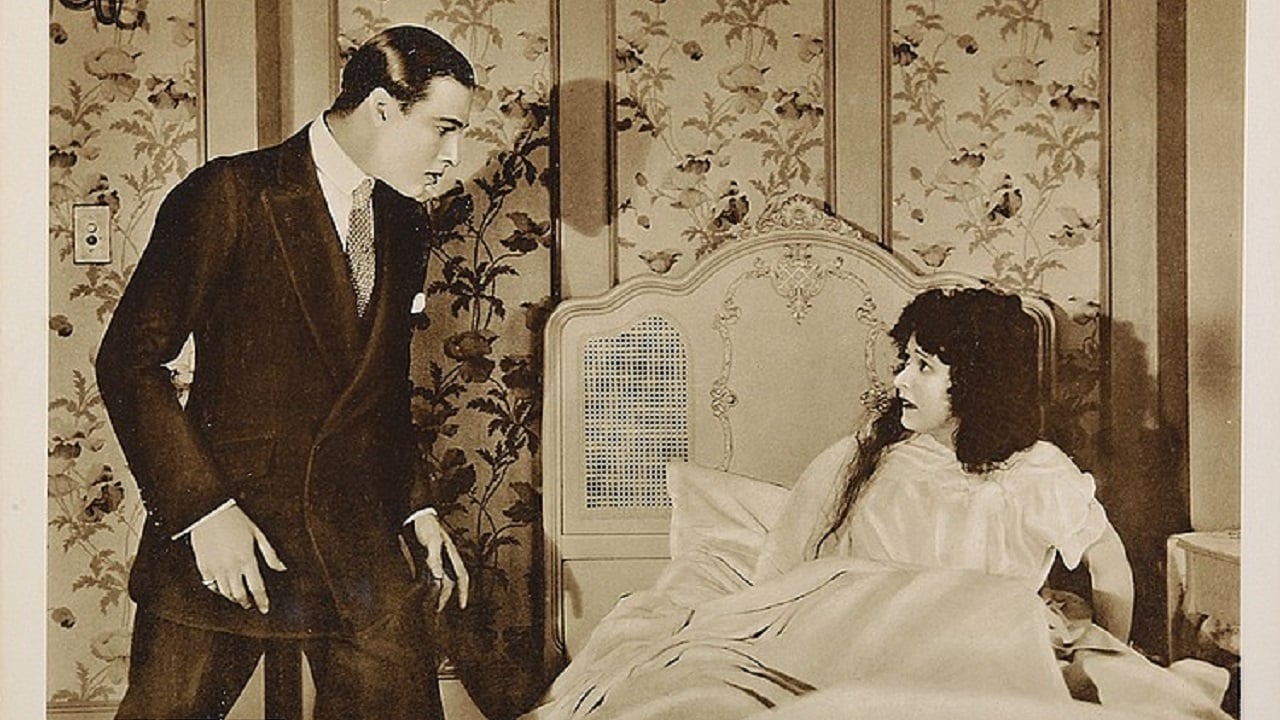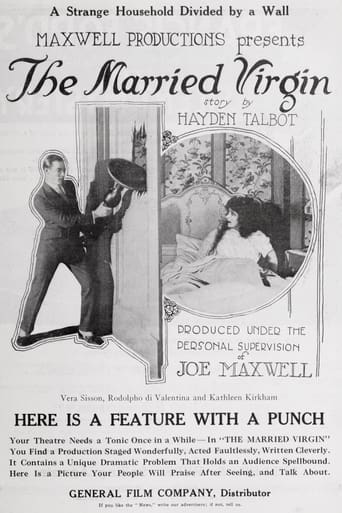

"The Married Virgin" is a bad movie by the standards of any era or genre. The only reason it has received a DVD release from a top company is that it features Rudolph Valentino—before he was a star. In it, he plays a swindler who has an affair with a married woman, and they try to blackmail her husband and his daughter. The film doesn't get much from the otherwise promising concept of an actor playing a character pretending to be another character. In one scene, Valentino's intertitles state, "You pay me a great compliment. I had no idea my acting was so convincing - - - but surely you know it is a performance." Unfortunately, not Valentino or anyone else in this film gives a convincing performance. At least, he and Vera Sisson (who is probably the actual lead here) are tolerable, which is more than can be said about the awful acting of those playing the stepmother and father.The melodrama is overwrought and boring. By the end, it doesn't even make much sense. The marriage part of the blackmail is unnecessary. Why would the father be more willing to pay off a blackmailer through the marriage of his daughter and subsequent "settlement" rather than just giving him the money and not dragging his daughter through such an ordeal? Additionally, in a large offense of telling instead of showing and manufacturing a happy ending out of nowhere, a single title card exonerates the father of his crimes; a man, who throughout the film, we had been told was guilty of murder and graft. The title claims, "Actually innocent, McMillan knows he must flee the state to escape a political frame-up."There is also some jarring continuity editing—throughout the film, cuts just seem to be a bit off. I doubt that has much to do with the restoration of this film given the professionals who did it. "The Married Virgin" was a B-picture of its day, made by a production company that I hadn't heard of. Somewhat interesting in the film is the employment of a flashback inside a flashback in one sequence, and there's a through the mirror shot of a character in another scene.
... View MorePrimitive, as one reviewer describes this film, is generous, this movie is really pathetic. The story is only driven along by the titles, after each one of which some poor excuse for a filmed scene "illustrates" what we've just read. It's the most ineptly conceived silent I've ever seen. Personally I think the best performance comes from the little lady. The stepmom's is quite odd, and I didn't get any "spark" between her and Rudy, as another reviewer did. I can't imagine this movie would have played well even in 1918. What is really kind of remarkable is that come time for the happy ending, not only does evil Rudolph get away scot free (Why? One wonders. Padded with so many superfluous bits mini flashbacks and "here's what she imagined would happen"s, it would have been simpler to use that wasted time to deal "the Count" some deserved fate.), but the really shocking thing, even for a pre-coder, is that dear old father-of-the-bride is never held accountable for a cold-blooded murder he'd committed early in his career. Absurdly, the audience is even asked to believe that this craven cow is innocent of more recent corruption charges. Evidently at all costs we can't have this "nice" old fool thrown into the pokey. In the end the happy couple rejoices at the woman's having gotten her marriage to "the Count" annulled. Funny that for the ill-playing pains to which the writer went to make the conclusion clear even to people unfamiliar with the concept of "annulment", it seems that unfortunately the author misunderstood the meaning of the word "wedlock". Maybe he'd seen dogs mating? At any rate he appears to have taken the word to mean "intercourse"!
... View MoreA typical pre-twenties silent melodrama centered around a main character who must sacrifice her own happiness for Duty. Here we have Mary (Vera Sisson), an ingénue who, to save her father from disgrace, gives up the man she loves to marry a blackmailing gigolo, Count Roberto (Rudolph Valentino, playing a more developed version of the "cabaret parasite" from "The Eyes of Youth"). As often happens with this sort of movie, the wicked supporting characters of the gigolo and the sly, sexy stepmother (Kathleen Kirkham)with whom he is in cahoots and having an affairare far more interesting than the virtuous leads. Perhaps Lillian Gish could have made prissy Mary's dilemma affecting , but as played by Sisson she comes off as a gormless twit who cannot even wade into ankle deep seawater to retrieve a rambunctious toddler. As the teaser title implies, the marriage between the gigolo and the prig stays unconsummated, everything leading up to the moment when a frustrated Roberto breaks down Mary's bedroom door (surely what the original audience went in hopes of seeing rather than Mary's noble sacrifices). She doesn't seem worth the effort, but this scene is excitingly filmed and is an interesting precursor to a similar event in "The Son of the Sheik." Valentino and Kirhham make this film worthwhile (there's a real spark between them), but try to find the restored DVD version, rather than sloppily made video production.
... View MoreThis is a really creaky film that will be of interest only to hardcore Rudolph Valentino fans. The plotline is so full of inconsistencies that keeping track of them ceases to amuse after a while. Valentino is the only point of interest in an this primitive film with a maddeningly inconsistent plot. The irony of Valentino's casting in this film as a man who never gets to consummate his marriage with his virgin wife is heavy in view of his unconsummated marriage to Jean Acker in real life.
... View More